Related Research Articles

Daniel Defoe was an English writer, trader, journalist, pamphleteer and spy. He is most famous for his novel Robinson Crusoe, published in 1719, which is claimed to be second only to the Bible in its number of translations. He has been seen as one of the earliest proponents of the English novel, and helped to popularise the form in Britain with others such as Aphra Behn and Samuel Richardson. Defoe wrote many political tracts, was often in trouble with the authorities, and spent a period in prison. Intellectuals and political leaders paid attention to his fresh ideas and sometimes consulted him.

Robinson Crusoe is an English adventure novel by Daniel Defoe, first published on 25 April 1719. Written with a combination of Epistolary, confessional, and didactic forms, the book follows the title character after he is cast away and spends 28 years on a remote tropical desert island near the coasts of Venezuela and Trinidad, encountering cannibals, captives, and mutineers before being rescued. The story has been thought to be based on the life of Alexander Selkirk, a Scottish castaway who lived for four years on a Pacific island called "Más a Tierra" which was renamed Robinson Crusoe Island in 1966. Pedro Serrano is another real-life castaway whose story might have inspired the novel.
This article contains information about the literary events and publications of 1729.
Captain Charles Johnson was the British author of the 1724 book A General History of the Robberies and Murders of the most notorious Pyrates, whose identity remains a mystery. No record exists of a captain by this name, and "Captain Charles Johnson" is generally considered a pen name for one of London's writer-publishers. Some scholars have suggested that the author was actually Daniel Defoe, but this is disputed.

Sir John Clerk, 2nd Baronet was a Scottish politician, lawyer, judge and composer. He was Vice-President of the Philosophical Society of Edinburgh, the pre-eminent learned society of the Scottish Enlightenment. Clerk was also the father of George Clerk-Maxwell and John Clerk of Eldin, and the great-great-grandfather of the famous physicist James Clerk Maxwell.
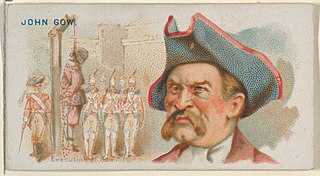
John Gow was a notorious pirate whose short career was immortalised by Charles Johnson in the 1725 work The History and Lives of All the Most Notorious Pirates and Their Crews. Little is known of his life, except from an account by Daniel Defoe, which is often considered unreliable, the report on his execution, and an account by Mr. Alan Fea, descendant of his captor, published in 1912, almost two centuries after his death.
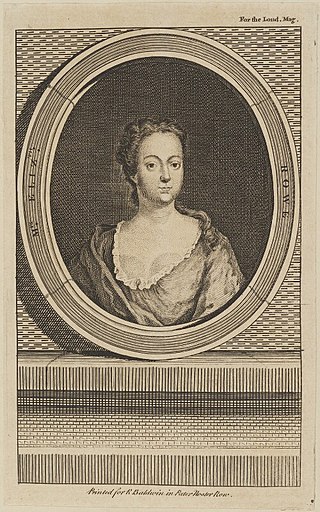
Elizabeth Singer Rowe was an English poet, essayist and fiction writer called "the ornament of her sex and age" and the "Heavenly Singer". She was among 18th-century England's most widely read authors. She wrote mainly religious poetry, but her best-known work, Friendship in Death (1728), is a Jansenist miscellany of imaginary letters from the dead to the living. Despite a posthumous reputation as a pious, bereaved recluse, Rowe corresponded widely and was involved in local concerns at Frome in her native Somerset. She remained popular into the 19th century on both sides of the Atlantic and in translation. Though little read today, scholars have called her stylistically and thematically radical for her time.
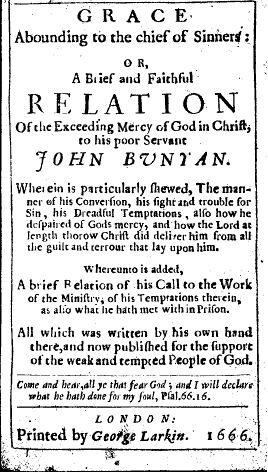
Spiritual autobiography is a genre of non-fiction prose that dominated Protestant writing during the seventeenth century, particularly in England, particularly that of Dissenters. The narrative generally follows the believer from a state of damnation to a state of grace; the most famous example is perhaps John Bunyan's Grace Abounding (1666). The first known spiritual autobiography is Confessions by Augustine of Hippo, or St. Augustine, which stands to this day as a classic when studying this genre.
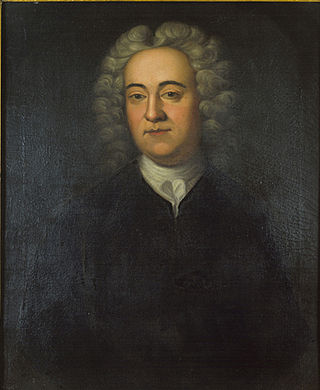
Daniel Dulany the Elder (1685–1753) was a prominent lawyer and land-developer in colonial Maryland, who held a number of colonial offices. In 1722 Dulany wrote a pamphlet entitled The Right of the Inhabitants of Maryland, to the Benefit of the English Laws, asserting the rights of Marylanders over the Proprietary Government.

Mere Nature Delineated is a pamphlet by Daniel Defoe, first published in 1726. The longer title under which it was originally published is Mere nature delineated: or, A body without a soul. Being observations upon the young forester lately brought to town from Germany. With suitable applications. Also, a brief dissertation upon the usefulness and necessity of fools, whether political or natural.
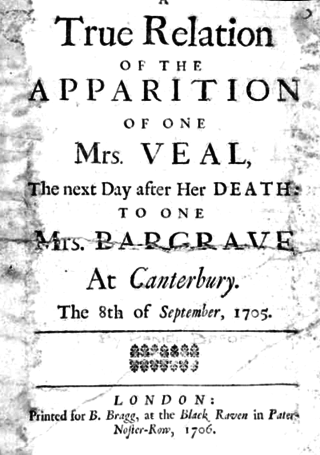
The Apparition of Mrs. Veal is a pamphlet that was published anonymously in 1706 and is usually attributed to Daniel Defoe. Titled in full A True Relation of the Apparition of one Mrs. Veal, the next Day after her Death: to one Mrs. Bargrave at Canterbury. The 8th of September, 1705, it has been described as "the first modern ghost story".
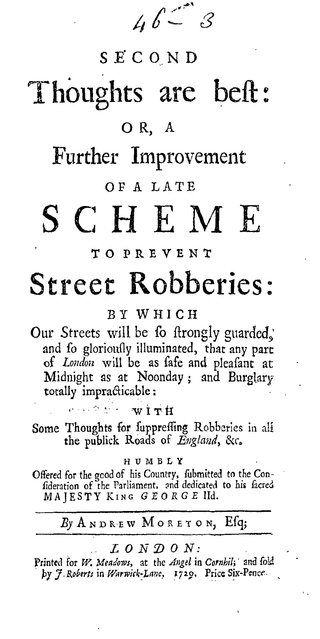
Second Thoughts Are Best: or, a Further Improvement of a Late Scheme to Prevent Street Robberies is a 1729 pamphlet by Daniel Defoe. He wrote it under the name of Andrew Moreton Esq., presented as a dissatisfied middle-class old man who was extremely concerned about the increase in criminality around the 1720s.
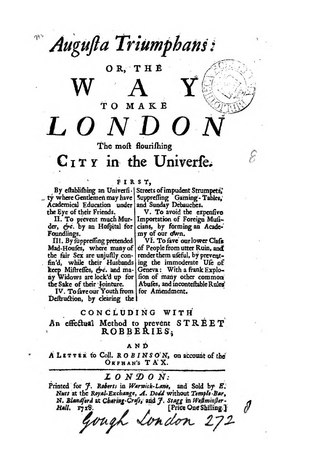
Augusta Triumphans: or, the Way to Make London the Most Flourishing City in the Universe by Daniel Defoe was first published on 16 March 1728. The fictitious speaker of this pamphlet, Andrew Moreton, is a man in his sixties who offers suggestions for the improvement of London. In particular, he fosters the establishment of a university, an academy of music, a hospital for foundlings and licensed institutions for the treatment of mental diseases. Moreover, he encourages the introduction of measures to prevent moral corruption and street robbery.
Agnes Campbell, Lady Roseburn, Scottish businesswoman, was "Scotland's wealthiest early modern printer."
Parochial Tyranny: Or, the House-Keeper's Complaint Against the Insupportable Exactions, and Partial Assessments of Select Vestries, &C is a 1727 pamphlet by Daniel Defoe. It deals with the corruption of parishes. Similarly to Every-body's Business, Is No-body's Business (1725), The Protestant Monastery (1726), Augusta Triumphans (1728) and Second Thoughts are Best (1729), it was published under the pseudonym of Andrew Moreton. Defoe did not sign his name to the majority of his works. He preferred them to be published anonymously or under one of his pen names. This choice was “sometimes” made “to conceal his authorship or to stimulate sales, but more characteristically to establish a point of view”.
The Protestant Monastery: or, a Complaint against the Brutality of the Present Age is a 1726 pamphlet by Daniel Defoe. It focuses on contemporary disrespect towards elders. Similarly to Every-body's Business, Is No-body's Business (1725), Parochial Tyranny (1727), Augusta Triumphans (1728) and Second Thoughts are Best (1729), it was published under the pseudonym of Andrew Moreton. Defoe did not sign his name to the majority of his works. He preferred them to be published anonymously or under one of his pen names. This choice was "sometimes" made "to conceal his authorship or to stimulate sales, but more characteristically to establish a point of view".
Everybody's Business is Nobody's Business: Or, Private Abuses, Public Grievances Exemplified is a 1725 pamphlet by Daniel Defoe. It deals with the "exorbitant Wages of our Women, Servants, Footmen". Similarly to The Protestant Monastery (1726), Parochial Tyranny (1727), Augusta Triumphans (1728) and Second Thoughts are Best (1729), it was published under the pseudonym of Andrew Moreton. Defoe did not sign his name to the majority of his works. He preferred them to be published anonymously or under one of his pen names. This choice was “sometimes” made “to conceal his authorship or to stimulate sales, but more characteristically to establish a point of view”.
An Essay Upon Projects (1697) was the first volume published by Daniel Defoe. It begins with a portrait of his time as a "Projecting Age" and subsequently illustrates plans for the economic and social improvement of England, including an early proposal for a national insurance scheme.
The Great Law of Subordination Consider'd; Or, the Insolence and Unsufferable Behaviour of SERVANTS in England Duly Enquired is a 1724 pamphlet by Daniel Defoe. Similarly to Every-body's Business, Is No-body's Business (1725), it focuses on issues related to servants. It also revises themes which its author had already dealt with in An Essay Upon Projects (1697).
Dalby Thomas was an English businessman and writer. Thomas was a commissioner of the glass duty, which administered taxes on bottles, dishes, and other glassware. Daniel Defoe became an accountant for Dalby Thomas in the fall of 1695, through 1699. Dalby Thomas was knighted 1 August 1703 at Windsor Castle -- "of Essex and London, general, and chief director for the Royal Africa Company"
References
- ↑ Backscheider, P.R. (1989), Daniel Defoe: His Life. Baltimore: Johns Hopkins University Press. p. 517. ISBN 0801845122.
- ↑ Backscheider, P.R. (1989). Daniel Defoe: His Life. Baltimore: Johns Hopkins University Press. p. 517. ISBN 0801845122.
- ↑ Backscheider, P.R. (1989), Daniel Defoe: His Life. Baltimore: Johns Hopkins University Press. p. 518. ISBN 0801845122.
- ↑ Backscheider, P.R. (1989), Daniel Defoe: His Life. Baltimore: Johns Hopkins University Press. p. 518. ISBN 0801845122.
- ↑ Novak M.E. (2014), Transformations, Ideology, and the Real in Defoe’s Robinson Crusoe and Other Narratives: Finding The Thing Itself, Rowman & Littlefield, ISBN 9781611494860